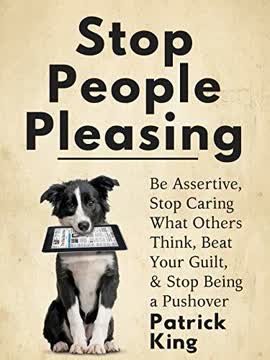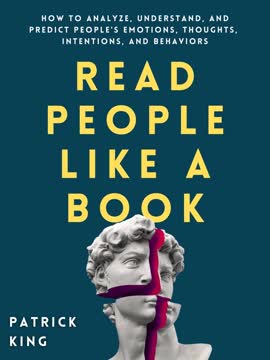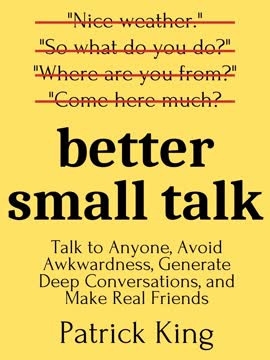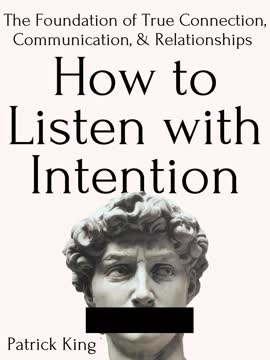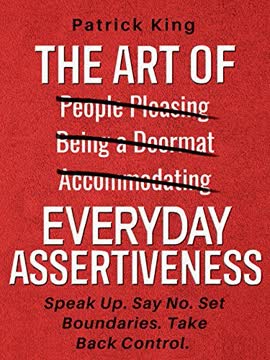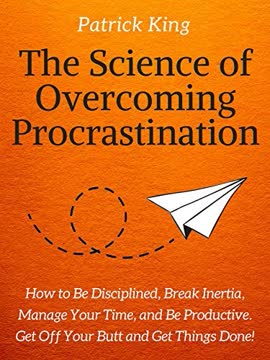Key Takeaways
1. People-Pleasing is Driven by Fear, Not Generosity
People-pleasing is a defensive act, whereas genuine concern and generosity are affirmative practices.
Understand the core difference. While appearing kind and selfless, people-pleasing stems from insecurity, fear of rejection, and a desperate need for approval, not a sincere desire to help others. It's driven by avoiding negative consequences rather than creating positive possibilities. This constant need to serve others to feel accepted is a defensive posture.
The hidden cost. People-pleasers often feel they are on the brink of rejection, leading to panic and doing anything possible to prevent it. This behavior, while seemingly altruistic, is ultimately self-serving, aimed at validating one's own worth through external approval. It can manifest as:
- Always appearing cheerful, even when unhappy
- Never asserting personal opinions or desires
- Promising help without intending to follow through
- Refusing to ask for help, even when needed
The Muriel example. Muriel, who constantly took on extra work and avoided voicing her professional opinions to please managers, was the first laid off because she didn't distinguish herself as a vital contributor. Her focus on pleasing others overshadowed her actual job responsibilities, illustrating how self-defeating people-pleasing can be.
2. Understand the Deep Roots of Your People-Pleasing
your tendencies toward people-pleasing are rooted in being disapproved of or rejected by someone from whom you seek validation.
Childhood influences matter. People-pleasing habits often originate in childhood experiences, particularly with parents or authority figures whose love or approval felt conditional. Repeated disapproval or perceived rejection can lead to poor self-esteem and a belief that one is not enough. This internalizes disapproval, shaping adult relationships.
Seeking validation externally. As adults, these early experiences can cause us to allow friends, employers, or partners to dictate our value. We ignore our own needs, working overtime for others to feel valuable and avoid rejection. This creates a cycle where we give others power and place ourselves in a subordinate role.
Other contributing factors. Beyond childhood, codependency can fuel people-pleasing, where excessive reliance on another leads to a fear of abandonment and attempts to earn affection through constant pleasing. A fear of confrontation also drives this behavior, as avoiding disagreement feels safer than risking unpleasantness or perceived retaliation, leading to suppressed emotions and resentment.
3. Recognize and Challenge Your Distorted Beliefs
many of those who are eager to please equate pleasing people with kindness and being good.
The "good person" trap. A significant cause of people-pleasing is the distorted belief that being a "good person" means always saying yes, being nice, and never asserting oneself. Conversely, saying no or prioritizing personal needs is seen as harsh or "bad." This black-and-white thinking makes people-pleasers vulnerable to exploitation.
Fear of shattering the image. Those who highly value being perceived as nice and good will go to great lengths to maintain this image, sacrificing their own time and effort. They fear that one instance of saying no could shatter the immaculate nice-person image they've worked hard to protect, leading to extreme people-pleasing and non-assertion.
Reframing goodness and selfishness. It's crucial to understand that assertiveness doesn't make you a bad person; it's necessary for healthy relationships. Similarly, selflessness can become a vice if driven by image rather than genuine concern. A necessary form of "good selfishness" involves prioritizing your own health and energy, which is essential for being able to genuinely care for others.
4. Reprogram Your Mindset to Embrace Healthy Selfishness
Being selfish isn’t always bad. In fact, it’s necessary to be selfish every so often...
Challenge the "selfish is bad" notion. The ingrained belief that putting yourself first is wrong fuels people-pleasing. This often starts in childhood, where prioritizing personal desires might be met with guilt-tripping or labels like "bad child." As adults, this conditioning makes us feel guilty about self-care.
Self-care enables service. The paradox is that you cannot effectively serve others if you are depleted. Constantly sacrificing sleep, health, and personal time leads to burnout, sickness, and resentment, ultimately diminishing your capacity to genuinely help. Prioritizing your well-being puts you in a better position to be there for others when it truly matters.
Prioritize your body and mind. Healthy selfishness means consciously making time for your physical and mental health. This involves:
- Protecting time for sleep, exercise, and healthy eating.
- Declining commitments that negatively impact your well-being.
- Recognizing and challenging self-defeating thoughts.
- Accepting that prioritizing yourself is not irresponsible or uncaring.
5. Build Self-Worth and Autonomy to Stop Seeking External Approval
By building more confidence and focusing on your own priorities, you’ll become approval-independent and stop using people-pleasing behaviors to feel loved and worthy.
Insecurity drives approval-seeking. A deep sense of insecurity and worthlessness leads people-pleasers to believe they are only valuable if they please others. They feel inherently lacking and seek external approval to fill this void, believing their worth is tied to their usefulness to others. This makes them overly sensitive to perceived rejection.
Shift focus inward. To break this cycle, you must realize your inherent worth and accept yourself as you are. This involves understanding that your feelings about yourself are shaped by your thinking, not external reality. True happiness and worth come from within, not from others' approval.
Cultivate autonomy. Autonomy is the ability to think and act independently, based on your own values and beliefs, not external expectations. An autonomous person helps others out of genuine concern, not fear of rejection. Developing autonomy means valuing your own opinion, acting with self-assurance, and not subordinating yourself to others' expectations.
6. Set and Enforce Clear Personal Boundaries
Creating boundaries is essential in your efforts to stop people-pleasing.
Boundaries define your space. Boundaries are invisible barriers protecting your personal (physical and emotional) space. They regulate how much others can intrude, allowing you room to be your true self without duress. People-pleasers often lack or underestimate the need for boundaries, letting others' obligations become their own.
Recognize boundary violations. Pay attention to physical and mental reactions (gut clenching, racing thoughts) when someone makes you uncomfortable – these are alarms signaling a boundary is being crossed. Identify what specifically about the person or situation is upsetting you. This self-awareness helps you define where your limits lie.
Define, communicate, and enforce. Setting boundaries requires determining your core values to understand what you need to protect. Communicate these limits clearly and directly to others, even if it feels uncomfortable. Crucially, set consequences for when boundaries are violated and be willing to enforce them. Failing to enforce boundaries makes them porous and signals to others they can be ignored.
7. Master Specific Techniques for Saying No Effectively
Learning to say no can be the ultimate assertive skill a person can possess.
Shift from "I can't" to "I don't". The language you use internally and externally impacts your ability to say no. Saying "I can't" highlights a limitation, requiring willpower. Saying "I don't" establishes a policy or identity, making the decision feel pre-made and easier to stick to. This empowers you and sets a firmer boundary for others.
Reject categories, not just requests. Instead of evaluating each request individually, decide to categorically reject certain types of requests. This removes the decision-making burden and makes saying no the default response. You can always choose to "opt-in" if a request genuinely aligns with your desires or priorities.
Use strategic refusal methods. When a direct "no" feels too difficult, employ techniques like:
- The Relational Account: Explain you can't help because you have existing responsibilities to others ("If I helped you, I'd be letting others down").
- "Yes, what should I de-prioritize?": Agree conditionally, asking the requester to help you decide which existing task to drop. This highlights your current workload.
- Preemptive No: In casual conversation, mention how busy you are or how you've had to say no to others recently, planting seeds before a request is even made.
8. Change Automatic People-Pleasing Habits Through Self-Awareness
Habits are automatic responses to what comes in front of us, and many of us at this point are just conditioned to automatically please and serve.
Become self-aware. People-pleasing often becomes an automatic habit, an unconscious response. The first step to changing this is developing self-awareness: questioning your motives ("Why am I doing this?"), understanding the emotions involved (fear, guilt vs. genuine care), and recognizing when you're about to people-please. Use techniques like the "five whys" to uncover root issues.
Cultivate autonomy and do less. People-pleasing erodes personal identity by making you dependent on others' opinions. Build autonomy by valuing your own thoughts and acting independently. Challenge the habit of doing too much; healthy relationships require mutual effort. Doing less creates space for others to step up and equalizes the dynamic.
Let go of the past and be honest. Past hurts or criticisms can condition you to people-please to avoid future disapproval. Consciously decide to let go of these past influences; they inform you but don't define you. Practice honesty by expressing your true feelings, thoughts, and needs, even if it causes mild tension. Setting boundaries requires clear, candid communication about your limits.
9. Learn to Handle Disapproval and Conflict with Strength
Facing this kind of reproach might be the hardest part of your journey out of people-pleasing behavior. But it’s also the one that might pay off the most...
Anticipate negative reactions. When you stop people-pleasing and start asserting yourself, some people will react negatively. They may be upset, angry, or try to make you feel guilty. This is often because you've conditioned them to expect your compliance. Prepare for this backlash and steel your resolve.
Don't take responsibility for their feelings. Remember, you are only responsible for your own thoughts, words, actions, and feelings. Others are responsible for their reactions. Their anger or disappointment is their issue, not yours to fix. Trying to immediately soothe them reinforces the people-pleasing dynamic.
Stay firm under pressure. When faced with criticism or anger:
- Consider the source: Their reaction might be more about them than you.
- Don't react immediately: Take a breath before responding.
- You don't owe an explanation: Your boundaries are your decision.
- Disagreements are normal: It's okay if others don't agree with your choices.
- Resist the urge to cave: It only takes a few seconds of willpower to stand firm.
Standing your ground, even when uncomfortable, builds resilience and self-respect, ultimately leading to healthier relationships based on mutual respect rather than fear-driven compliance.
Last updated:
FAQ
1. What is "Stop People Pleasing" by Patrick King about?
- Core Focus: The book addresses the problem of people-pleasing—constantly prioritizing others’ needs and approval at the expense of your own well-being.
- Goal: It aims to help readers recognize, understand, and break free from self-defeating people-pleasing habits.
- Practical Approach: Patrick King provides actionable strategies, psychological insights, and real-life examples to help readers become more assertive and set healthy boundaries.
- Outcome: By following the book’s advice, readers can reclaim their autonomy, improve self-esteem, and lead more authentic, fulfilling lives.
2. Why should I read "Stop People Pleasing" by Patrick King?
- Identify Harmful Patterns: The book helps you recognize if you’re a people-pleaser and understand the negative impact it has on your life and relationships.
- Actionable Solutions: It offers practical tools and step-by-step methods to change ingrained habits and beliefs.
- Empowerment: Readers learn to assert themselves, say no without guilt, and set boundaries, leading to healthier relationships and greater self-respect.
- Emotional Well-being: The book addresses the emotional roots of people-pleasing, such as fear of rejection and low self-worth, and provides ways to heal and grow.
3. What are the key takeaways from "Stop People Pleasing" by Patrick King?
- People-pleasing is Harmful: It’s rooted in insecurity, fear, and a need for approval, and leads to self-neglect, resentment, and unhealthy relationships.
- Origins Matter: Childhood experiences, low self-worth, fear of confrontation, and distorted beliefs about kindness often drive people-pleasing.
- Change is Possible: Through self-awareness, cognitive behavioral techniques, and habit change, you can reprogram your beliefs and behaviors.
- Boundaries and Assertiveness: Setting clear boundaries and learning to say no are essential skills for overcoming people-pleasing.
4. How does Patrick King define people-pleasing in "Stop People Pleasing"?
- Not True Generosity: People-pleasing is not genuine kindness; it’s driven by insecurity, fear of rejection, and a need for approval.
- Defensive Behavior: It’s a defensive act to avoid negative consequences, not an affirmative act to create positive outcomes.
- Self-Neglect: People-pleasers suppress their own needs, opinions, and emotions to keep others happy, often at their own expense.
- Cycle of Resentment: This behavior leads to built-up resentment, passive-aggression, and ultimately damaged relationships.
5. What are the main causes of people-pleasing according to "Stop People Pleasing"?
- Distorted Beliefs: A belief that serving others is always good and putting oneself first is selfish or bad.
- Low Self-Worth: Feeling unworthy of love or acceptance unless constantly pleasing others.
- Fear of Confrontation: Avoiding conflict at all costs, leading to non-assertive behavior and suppressed needs.
- Childhood Conditioning: Early experiences of conditional love, rejection, or codependency often set the stage for people-pleasing habits.
6. What is the "spotlight effect" and how does it relate to people-pleasing in Patrick King's book?
- Definition: The spotlight effect is the tendency to overestimate how much others notice and judge your actions.
- Amplifies Insecurity: For people-pleasers, this effect intensifies the fear of disapproval and rejection.
- Behavioral Impact: It leads to over-modulating behavior, increased anxiety, and avoidance of assertiveness.
- Solution: The book suggests observing others’ reactions objectively to realize that far fewer people are focused on you than you think.
7. How does "Stop People Pleasing" by Patrick King suggest reprogramming beliefs and thought patterns?
- Cognitive Behavioral Therapy (CBT): The book recommends using CBT principles to identify and challenge distorted thoughts.
- The BLUE Model: Recognize negative thinking patterns—Blaming myself, Looking for bad news, Unhappy guessing, and Exaggeratedly negative thoughts.
- Replace with True Thoughts: Actively substitute negative beliefs with realistic, compassionate, and empowering thoughts.
- Practice Self-Compassion: Learn to accept and love yourself, and understand that assertiveness and self-care are not selfish.
8. What practical habits does Patrick King recommend to stop people-pleasing?
- Build Self-Awareness: Regularly question your motives and recognize when you’re acting out of fear or habit.
- Develop Autonomy: Value your own opinions and make decisions based on your needs, not just others’ expectations.
- Do Less: Stop over-functioning in relationships and allow others to take responsibility for themselves.
- Let Go of the Past: Acknowledge and release the influence of past negative experiences or criticism.
- Be Honest and Assertive: Communicate your needs and boundaries clearly, even if it causes temporary discomfort.
9. How does "Stop People Pleasing" by Patrick King advise setting and enforcing boundaries?
- Define Core Values: Identify what’s truly important to you and use these values to set your boundaries.
- Communicate Clearly: Explicitly state your boundaries to others—don’t rely on hints or passive signals.
- Set Consequences: Decide in advance what actions you’ll take if someone violates your boundaries, and follow through.
- Adjust as Needed: Recognize that boundaries can be healthy, rigid, or porous, and adjust them based on the situation and relationship.
- Prepare for Pushback: Expect some negative reactions, but understand that others’ discomfort is not your responsibility.
10. What techniques does Patrick King offer for saying no assertively in "Stop People Pleasing"?
- Use “I Don’t” Statements: Saying “I don’t” instead of “I can’t” frames your refusal as a personal policy, making it less negotiable.
- Reject Categories: Set blanket rules for types of requests, making it easier to say no without guilt.
- Relational Account: Reference your existing commitments to others when declining new requests.
- De-Prioritize: If you must say yes, ask what should be deprioritized to accommodate the new request.
- Keep It Simple: Use direct, concise refusals and avoid over-explaining or justifying your decision.
11. What are the most common pitfalls and challenges when trying to stop people-pleasing, according to Patrick King?
- Guilt and Anxiety: Feeling guilty for prioritizing yourself or fearing others’ disappointment.
- Pushback from Others: Facing resistance or anger from people accustomed to your compliance.
- Difficulty Enforcing Boundaries: Struggling to follow through with consequences when boundaries are crossed.
- Relapsing into Old Habits: Automatically reverting to people-pleasing behaviors under stress or pressure.
- Misunderstanding Assertiveness: Confusing assertiveness with aggression or fearing it will damage relationships.
12. What are the best quotes from "Stop People Pleasing" by Patrick King and what do they mean?
- “The need to please others may appear to be generous and selfless, but it is one of the most selfish ways of behavior.”
- This highlights that people-pleasing is often about self-protection and seeking approval, not true generosity.
- “People-pleasers are not born—they’re made.”
- Emphasizes that these behaviors are learned and can be unlearned with conscious effort.
- “No can be a complete sentence.”
- Encourages readers to assert their boundaries without feeling obligated to justify or explain themselves.
- “You must be more selfish. Often, we have the belief that selfishness is always bad and never good. The reality is that you must be selfish, even if you want to serve others, because only then can you operate at full capacity.”
- Reframes selfishness as necessary self-care, not a negative trait.
- “A life devoid of no is one that is not your own; it is one that is lived for other people.”
- Reminds readers that saying no is essential for living authentically and maintaining control over their own lives.
Review Summary
Stop People Pleasing receives mixed reviews, with an average rating of 3.84/5. Many readers find it helpful for understanding and overcoming people-pleasing tendencies, praising its practical advice and relatable examples. Some appreciate its straightforward approach and easy-to-apply techniques. However, others criticize repetitive content and feel the examples are unrealistic. The book is generally recommended for those struggling with assertiveness and setting boundaries, though some readers find it basic if they've read similar self-help books.
Download PDF
Download EPUB
.epub digital book format is ideal for reading ebooks on phones, tablets, and e-readers.
